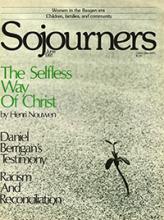The experience of natural families within Christian communities has been of central importance to people who desire to share a life that holds the promise of growth for children, parents, and single adults. At the annual meeting in February of the Community of Communities, a circle of communities of which Sojourners Fellowship is a part (see "A Community of Communities," January, 1980), Sojourners convened an informal discussion on this topic. Members of several different communities participated in the conversation found below.
Joe Roos (Sojourners Fellowship): Let's begin with looking at how community life and natural family life affect each other. How do they nurture each other, and how do they conflict?
Virgil Vogt (Reba Place Fellowship): I've been impressed over the years at how necessary the larger community is to the health and growth of natural families. Members of the natural family need other people with whom they can work out tensions and struggles so that the natural family does not carry those burdens alone.
People need to get the message that family is important. A community can give the necessary words of encouragement so that the competition of the society and all that we are involved in—jobs, recreation, education—don't make us neglect family.
Margo Farra (Community of Celebration): My husband, John, and I share a common desire about what to do with our life and our family, and the community is an outlet for that vision.
John and I can't give our four children all the love they need. We can't contain all of our brokenness, all of our needs for love and acceptance, just in each other. Making a way for people to come in and be a part of our marriage and our family enables our children to feel more loved and accepted.
Read the Full Article

